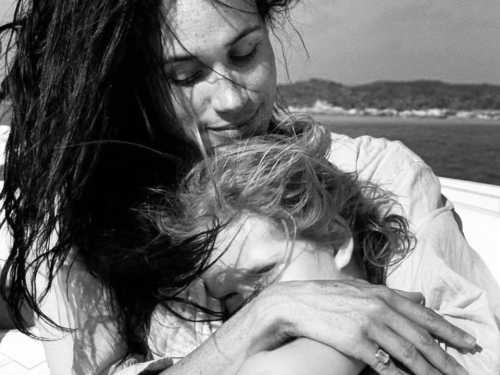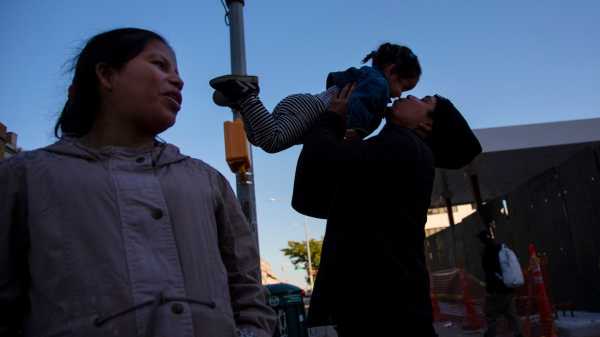
Deep in the jungle, Yenis Andrade and her husband, Alexis, were ordered to stay quiet. The couple and their infant child were entering one of the most dangerous parts of their trek across the Darién Gap, a sixty-mile stretch of rugged mountains, rain forest, and swamps that extends on both sides of the border between Panama and Colombia. It was, as their smuggler informed them, where thefts and rapes by armed groups most commonly occurred. Yenis pressed on in silence and began to pray, as her feet became heavy with mud. She said a prayer for her daughter, who lay asleep, strapped to her husband’s chest; another one for the child in her womb, whom she was due to deliver in five months, and a final prayer for the other twelve family members who walked by her side, equally determined to reach American soil.
Yenis and Alexis met in 2017, while serving in the Venezuelan military. Two years later, the opposition leader Juan Guaidó, who had declared himself interim President in early 2019, called on the armed forces to defy the regime of Nicolás Maduro. Hundreds of soldiers, including sergeants like Alexis, who is now twenty-nine, defected and fled to neighboring Colombia. (He asked that his family name not be disclosed due to fears of retaliation.) Yenis, who is twenty-eight, decided to follow him, and the couple—who are not yet married but consider themselves husband and wife—settled in the western city of Cali, where they made a modest living, selling masks and vegetables on the street. Eventually, Alexis landed a job as a door-to-door salesman, earning the equivalent of a couple hundred dollars a week—enough to afford a spacious home, where he and Yenis had their first daughter, Diana.
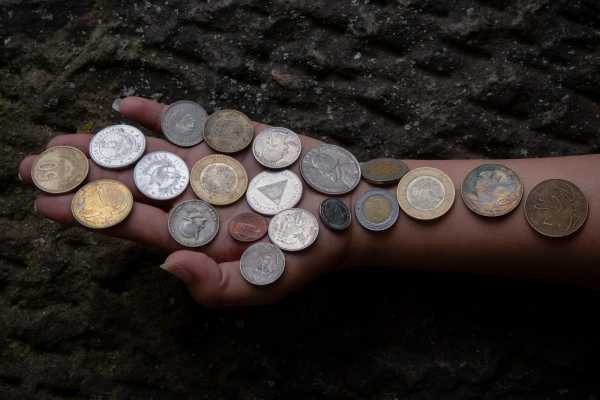
Yenis holds coins from different countries she visited on her journey from Colombia to the United States, including Panama, Nicaragua, Guatemala, and Mexico.
Last year, one of Alexis’s cousins decided to try his luck in the United States. He and his wife set off from northern Colombia, reached Panama through the Darién Gap, and crossed five more countries on foot and by car. It wasn’t clear how long they could legally stay in the U.S., but it mattered little to the rest of the family. In the couple’s telling, life in the United States was prosperous, colorful, and full of promise. Before long, Yenis was asked by her sister-in-law Yorgelis if she and Alexis could picture their lives in the U.S. After Yenis immediately responded “Yes,” she was invited to join a family group chat called La Selva, or the Jungle.
Alexis told everyone in the group that they had lost their minds. He had heard horror stories surrounding the Darién Gap, where the number of migrants attempting to cross the jungle had risen sharply, as had the number of people who did not make it out of the area alive. Those who did described families being carried away by strong river currents, women dragged into the brush by armed strangers clad in black, and children emerging alone from the jungle’s winding paths, after their parents failed to make it through. “Think about the baby, think about you,” Alexis pleaded with his wife, who was newly pregnant.
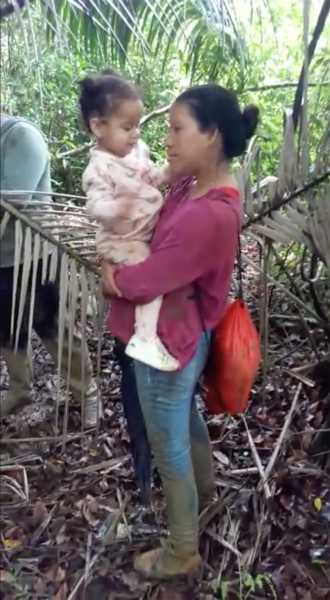
A screen capture from a video shows Yenis and her then one-year-old baby, Diana, crossing the jungle of the Darién Gap. Yenis was pregnant at the time.
Yenis was aware of the dangers, but she also struggled to see a prosperous future in Colombia. The pandemic had taken a toll on the family’s finances, and their debts kept piling up. “If I’m going to live day by day here, I’d rather live day by day in Venezuela,” she told Alexis, who faced treason charges in their home country. Her husband made a final plea: “If you get raped, there will be absolutely nothing I can do to prevent it. If they kidnap our daughter, we will have to assume her to be missing.” Then he asked Yenis, “Is that something you’re willing to go through? To have that weigh on your conscience for the rest of our lives?” His wife was determined to take the risk.
Just as they did when fleeing Venezuela, the couple put all of their belongings up for sale. They collected five hundred dollars, part of which they used to buy basic supplies for the trip, including a tent, mountain boots, bug repellent, and raincoats. Yorgelis had got in touch with a smuggler on TikTok, where human traffickers openly advertise “safe” and “guaranteed” trips to the U.S. The smuggler proposed two different routes across the Darién. For about two hundred dollars apiece, the family members could cross the jungle by foot in a week. For a hundred dollars more each, they could take a shortcut and make it to Panama in three days.
To accommodate everyone’s budgets, the family chose the lengthiest route and agreed on a departure date: the twenty-sixth of May. Eleven family members, among them four children, who ranged in age from newborn to seven years old, would join Alexis, Yenis, and their daughter. Carrying several hundred dollars in cash, the couple got on a bus with the rest of the group headed to Necoclí, a coastal town on the southernmost tip of the Caribbean Sea. For most migrants, whether they hail from Venezuela, Haiti, Bangladesh, or Uzbekistan, Necoclí is a mandatory stop on the journey north, as it is where boats headed to the jungle set off from. Last year, a quarter of a million people attempted to cross the Darién Gap.
The family had planned to buy their necessary provisions in Necoclí: a camping stove, five or six gas cannisters, and an array of canned goods, along with pasta and rice. Water was too heavy to carry, so they decided to rely on the jungle’s rivers. After Necoclí, the family’s next stop would be Capurganá, a town at the foot of the Darién Gap, where South and Central America meet. The people who abandon their journey through the Darién area, or are injured along the way, are often found on the side of the trail, waiting for nature to take its course. The jungle’s many paths bear traces of migrants’ despair—from everyday belongings to human bones. Like others before them, Alexis and Yenis ultimately got rid of their gas cannisters and stove to lighten their load along the way. They did without food during the last days.
Near the end, the smuggler left the family at the base of a mountain dubbed the Hill of Death. It was known among migrants as the most brutal point in the journey, where the slightest slip could be lethal. Alexis had heard that it took about five hours to climb up the steep slope, so his plan was to camp at the bottom and rise early the next day. “But we couldn’t stay,” he told me. “The stench of death was hard to stand.” After six hours, the family made it across, certain that the Panamanian border wasn’t too far off. Days later—past a few rivers, where Indigenous tribes collected a fee and let them spend the night—Alexis and Yenis reached a camp for migrants, where United Nations staff assisted them. Save for Diana, who was diagnosed with bronchitis, the rest of the family was safe. They had survived the Darién Gap.
For the next leg of the journey, Yenis and Alexis walked, rode buses, hitched rides, and begged for money as they slowly traversed roughly three thousand miles, from Panama to South Texas. While crossing through Costa Rica, Nicaragua, Honduras, Guatemala, and Mexico, the family relied on dozens of strangers, who let them ride in their cars, sleep under their roofs, or dropped a dollar bill in their cup. Over time, the journey grew Darwinian, as not everyone in the family had saved enough to make it all the way to the U.S. border. Those who had more cash moved through Central America and Mexico faster. Yenis and Alexis, who had less money and moved at a slower pace because of the pregnancy, trailed behind the rest of the group.
Along the way, the family had to haggle with human traffickers and local authorities. They spent a month and a half crossing Mexico, Alexis said, where it was hard to tell an immigration agent from a smuggler. Near the southern border, the couple spotted many other migrants, mostly from Venezuela. U.S. Border Patrol agents were detaining high numbers of Venezuelan migrants and releasing them in the United States while their immigration cases were being processed. Between 2015 and 2019, an average of fifty Venezuelans were apprehended along the Southwest border each month. But around the time Yenis and her husband made their way north, last August and September, the numbers rose to nearly sixty thousand. Under mounting political pressure, the Biden Administration began developing a new policy to thwart these crossings.
Three months after leaving Colombia, Yenis, Alexis, and Diana, who was now a year old, arrived in Piedras Negras, Mexico, mere feet from the Rio Grande River. Alexis felt restless—he was closer than ever to the United States, but he was plagued by too many worries to fully appreciate it. Several migrants had drowned attempting to cross the river in recent days. What if it happened to him and his family? Alexis wondered. His phone kept pulsing with messages from his father, who had already made it across: “Mijo, they’re sending a lot of people back to Mexico,” his father warned. The following day, Alexis rose at five with his wife and child, intent on reaching the river while it was still quiet. As he walked north, clutching Diana to his chest, a man dashed in front of him. “Jefe! Are you going to cross?” Alexis shouted instinctively. “Yes!” was his reply.
Trailing behind the man were a middle-aged woman, three girls, and one boy; Alexis and Yenis hurried to keep up with them. “How’s it looking?” Alexis asked the man, who had slowed his pace to get through a tangled patch of brush. The man pressed on, without saying a word—a sign that Alexis took to mean he knew his surroundings well. Within minutes, they reached a hill overlooking the riverbank. The current seemed mild, so Alexis rushed down to dip his feet in the waist-deep water. While Yenis readied herself to cross, Alexis learned that the woman in the other group was Salvadoran; she was in the company of her four children. Each of them got in line to form a human chain across the Rio Grande.
Once in the water, Yenis turned her back on the current to minimize its impact on her belly. There was an islet mid-river, where she paused to regain her breath, and everyone else huddled around her. It was there that the Salvadoran woman confided that she needed a favor. She had heard that Salvadoran adults, unlike Venezuelans, were not being let into the U.S. Like Alexis and Yenis, she and her children had been through too much to risk deportation, so she needed her son and daughters to make the final leg of the trip on their own. The couple exchanged glances, unable to utter a single word—they felt enough responsibility already with Diana and their unborn child. But, before they could say no, the woman began to wade in the opposite direction. “Me los cuidan, por favor,” she said—“Please, take care of them.”
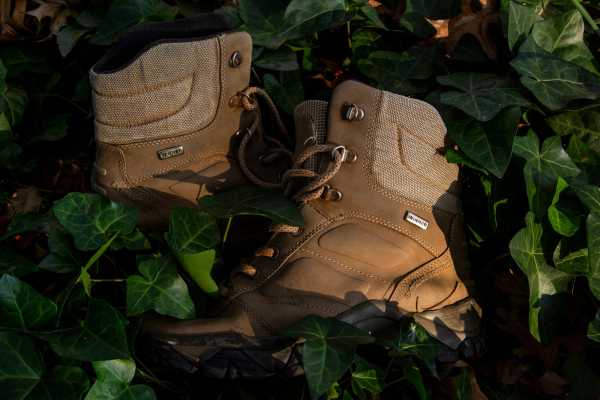
The boots that Yenis wore while crossing the Darién Gap, at the beginning of their journey to the U.S.
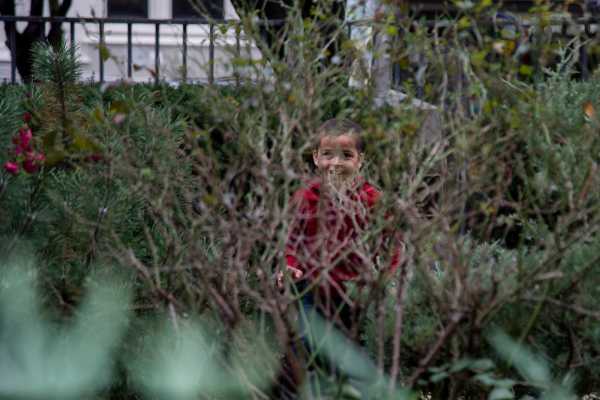
Isaac, one of Yenis and Alexis’s nephews, in a garden in front of Mount Sinai West. Isaac was part of the group, including Yenis and Alexis, that crossed the Darién Gap.
On the American shore, Alexis shed his first tears. He, his wife, and their child were thirsty, starved, and exhausted from the heat, but they had reached their destination at last. Near the riverbanks, the family came across a U.S. Border Patrol station, where an officer in uniform warned them, in broken Spanish, “If you’re carrying a phone, tell your relatives you’ve made it through, before immigration agents take your phones away.” But they had no signal on that side of the river—no one in their family knew that they had made it across.
“Where are you coming from?” one of the agents asked, in Spanish.
“Venezuela,” Alexis responded.
“And them?” the agent said, pointing to the Salvadoran children.
“We just met them on our way here.”
Border Patrol took the group to a nearby facility, where they spent three nights. The couple was separated from the Salvadoran children and never saw them again. Agents there asked Alexis or Yenis if they had a place to go. Their answer was no, but they had a city in mind. “New York,” Alexis said. Migrant shelters there were at capacity, the agent warned. Why not try Missouri or Oklahoma instead? Hardly anyone ventured there, he said. But Alexis didn’t know anyone in those two states and his family was waiting in New York. He, Yenis, and Diana boarded a bus bound for the city after their release.
Six weeks later, the Secretary of Homeland Security, Alejandro Mayorkas, announced a new policy: any Venezuelans attempting “to cross the southern border of the United States illegally will be returned to Mexico.” After thousands of miles and months of effort, the family had narrowly avoided failure.
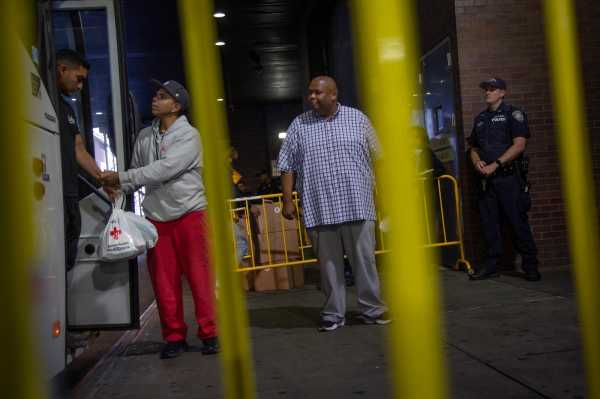
Power Malu, a social activist, at the Port Authority Bus Terminal, in New York City, welcoming migrants, in September, 2022.
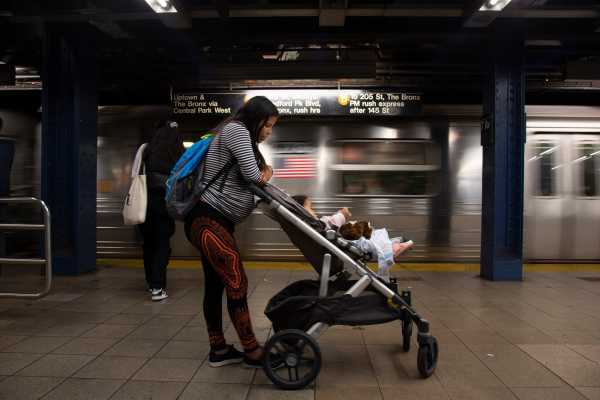
Yenis with her daughter Diana at a subway station in Queens.
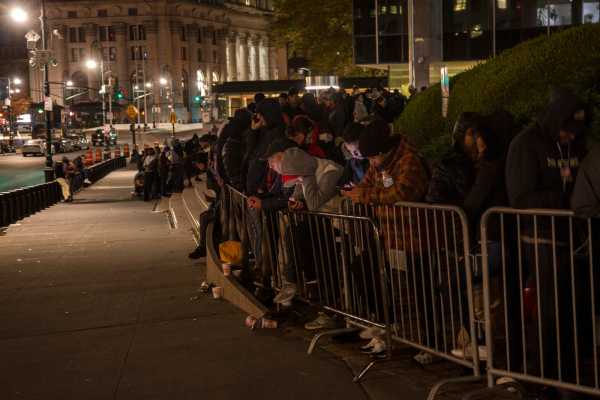
Hundreds of migrants, mostly from Venezuela, wait in line outside an immigration-services building in Manhattan, in October, 2022.
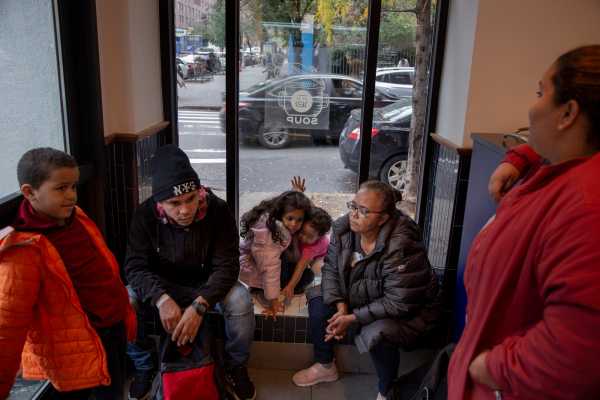
Alexis (second from the left) waits with his family at a café near Mount Sinai West, where his wife is in labor.
More than twenty-four hours after leaving Texas, Alexis, Yenis, and Diana stepped off a bus in Manhattan, along with dozens of other migrants, most of them from Venezuela. For months, hundreds of buses arrived in New York City from the southern border, carrying Venezuelans and other asylum seekers from Latin America. Numerous advocacy groups, including immigrants’-rights organizations and religious charities, became a constant presence at Port Authority and a lifeline for those who had never before set foot in the city. From the bus terminal, a volunteer took Alexis, Yenis, and Diana to a location in the Bronx where they were assigned a hotel in Manhattan, their first home in New York. They later moved to an inn on Queens Boulevard; the rest of the family was already scattered around the city.
For Alexis, finding a job was a top priority—so was moving the family out of temporary housing. Occasionally, prospective employers stopped by hotels and shelters, looking for cheap labor. After Hurricane Ian struck Florida, dozens of migrants were offered work travelling there and helping with the post-disaster cleanup. Many migrants left New York in frustration after a few weeks or months. Single men headed to Canada, in search of better job opportunities, and others moved to the American South, looking for warmer weather. At times, people’s experiences clashed with their conception of life in New York, where at least two migrants have taken their lives in the city’s shelters.
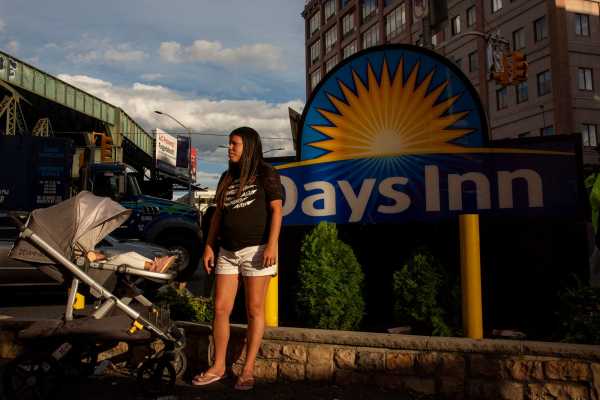
Yenis and her daughter Diana, in front of the hotel where the family currently lives, in Queens.
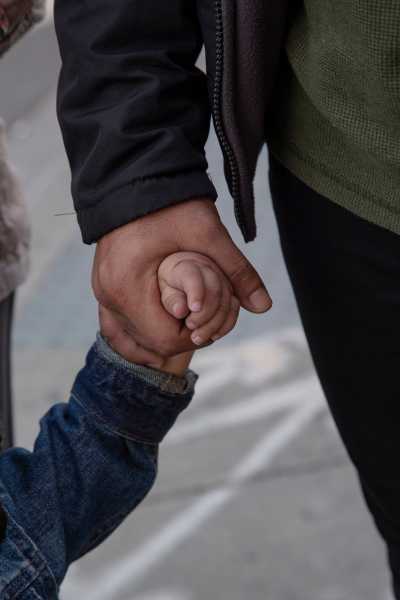
Alexis holds his daughter Diana’s hand during a walk in the area where the family lives, in Queens.
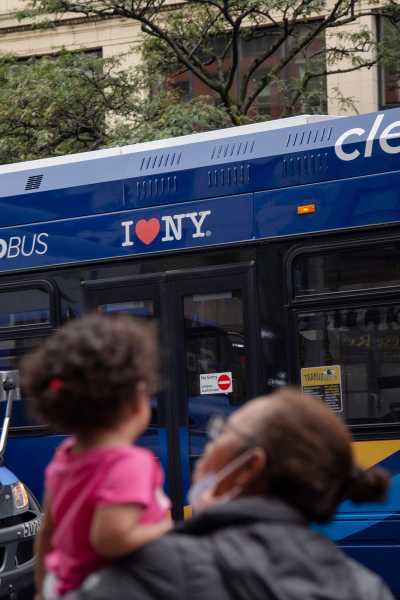
Karina, Alexis’s mother, comforts her granddaughter Diana as the family waits for news about Yenis’s childbirth.
For now, Alexis and Yenis were determined to stay. Three of the family’s four male members quickly found jobs—Alexis as a line cook at a Dominican restaurant in Brooklyn, where he worked the night shift, and his father and one of his brothers at a bodega nearby. All the children were enrolled in public schools, except for the youngest ones; Diana spent her days alongside her mother in their hotel room. And Yenis, with help from a local charity, had found a hospital, Mount Sinai West, where she could deliver her baby.
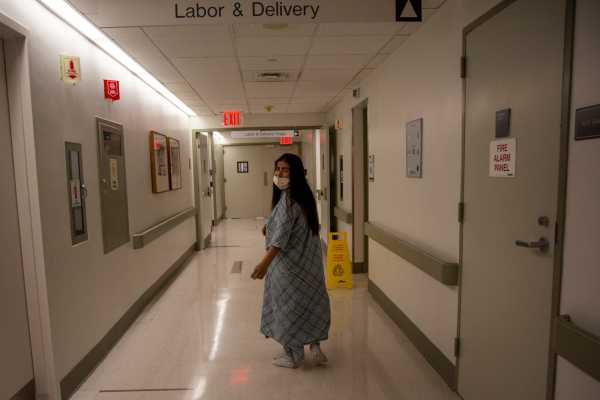
Yenis at Mount Sinai West, on her way to the delivery room.
On the morning of October 24th, she arrived for a C-section and entered the operating room with Yorgelis, her sister-in-law. Too scared of the procedure to witness it, Alexis waited at a café across the street from the hospital, with his mother and daughter, who was dressed in a velvet dress and patent-leather shoes.
About an hour later, the phone of Alexis’s mother, Karina, buzzed. “She’s born!” the grandmother exclaimed, holding her phone and an open message from Yorgelis. “Luciana Charlotte is born—and she’s a girl!”
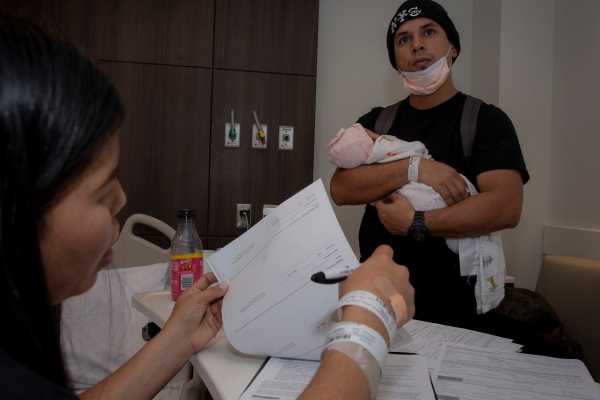
Alexis holds Arantxa while Yenis fills out hospital paperwork for their daughter, a new United States citizen.
Alexis looked perplexed. “She never mentioned the name Luciana,” he said, of his wife. “We’ve been looking everywhere online and it’s never come up once.” Karina, the grandmother, was nonchalant. “Oh, enough! She’s so big!” She showed him the first picture of the baby, who weighed a little more than seven pounds. “And look at those eyes! Dios mío, they’re wide open.”
“I guess we could call her Luz,” Alexis said to himself. He liked the meaning of it—the Spanish word for “light.” Charlotte, to him, was only fitting, given her place of birth. (Later, he and his wife changed her name to Arantxa.)
The following day, Yenis was cradling the baby in her hospital room, which overlooked the Manhattan skyline. “Everything is different here,” she said. Yenis heard a gentle knock at the door. It was a lactation specialist, who had come for a quick check-in. “I only know a little bit of Spanish,” the specialist, an amiable woman in her thirties, said. Resting on a nearby table was a breast-feeding diary, which Yenis had been unable to fill in, because she could not read it. The woman wanted to know if she had breast-fed Diana and for how long. “A year and three months,” Yenis said. Diana had become so dependent that Yenis was hoping to introduce some formula into the new baby’s diet this time around. “It’s a delicate balance, only something that you can decide,” the specialist explained. These quiet moments made the family’s journey seem like a distant memory. But they were the kind of moments that they had longed for on their transcontinental journey.
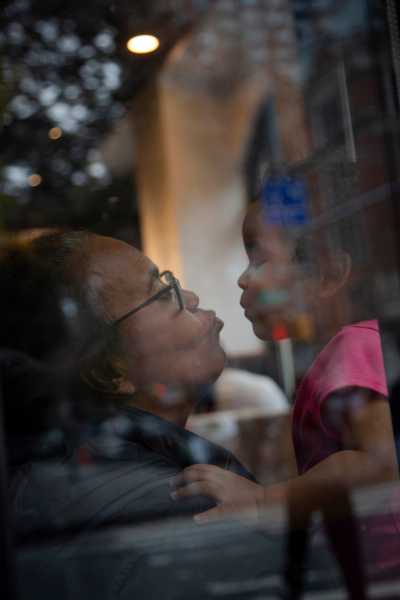
Karina, Alexis’s mother, with her granddaughter Diana.
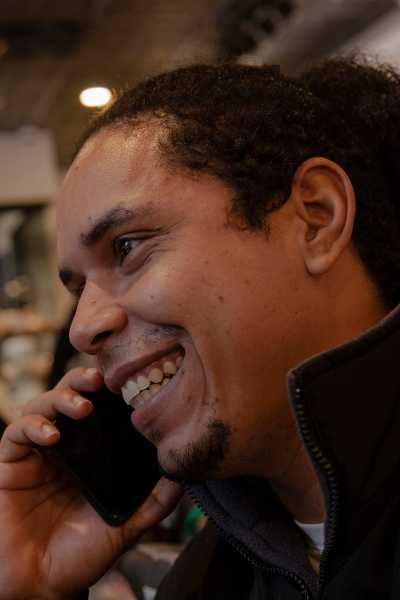
Alexis, shortly after the birth of his daughter Arantxa.
After the counsellor left, Karina walked in, looking visibly worried. She had just heard from one of her sons. Unlike most of the family, whose immigration-court hearings were scheduled for 2024 or later, she explained, he had been asked to appear this year in court with his wife and their year-old baby. “He wasn’t given an explanation,” Karina said, with an air of helplessness. Since the family could not afford a lawyer, they would have to deal with the uncertainty of a possible deportation. But, no matter the length of their stay, Yenis argued, they were fortunate to have made it into the country. Since President Biden’s new policy had taken effect, thousands of Venezuelans had been detained after crossing the border and then were deported to Mexico, where they were now stranded. For now, the family’s life in New York carried on. Was the journey worth it? I asked. “Sí,” Yenis said, looking placidly at her newborn daughter.
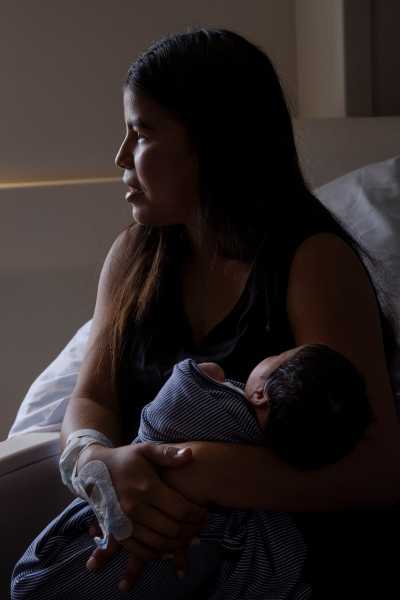
Yenis holds her newborn daughter, Arantxa.
A photograph was removed from this article after publication.
Sourse: newyorker.com

